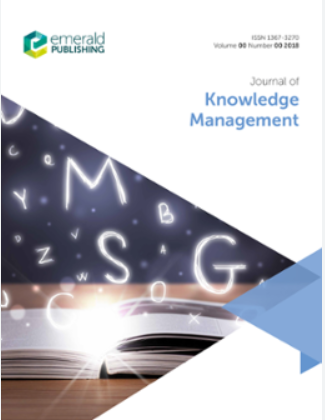Does perceived overqualification promote (or inhibit) knowledge-sharing behavior? The roles of intrinsic motivation and rewards for knowledge sharing
IF 6.6
2区 管理学
Q1 INFORMATION SCIENCE & LIBRARY SCIENCE
引用次数: 0
Abstract
Purpose The relationship between perceived overqualification and knowledge sharing has always been a hot topic, but scholars have come to different conclusions on this issue. The purpose of this study is to integrate conflicting conclusions by considering the moderating role of rewards for knowledge sharing and the mediating role of intrinsic motivation in the relationship between perceived overqualification and knowledge sharing based on self-determination theory. Design/methodology/approach The authors collected three-wave survey data from 246 research and development employees in four companies in China. Findings The results showed that when rewards for knowledge sharing was higher, employees with perceived overqualification would have higher intrinsic motivation, which could promote their knowledge-sharing behavior. However, when rewards for knowledge sharing was lower, employees with perceived overqualification would have lower intrinsic motivation, thus inhibiting their knowledge-sharing behavior. This result supported the informational function rather than the controlling function of rewards for knowledge sharing. Originality/value By considering the important boundary condition of rewards for knowledge sharing, this study reconciles the contradictory conclusions on the relationship between perceived overqualification and knowledge-sharing behavior. At the same time, the authors tell organizations that they can increase the knowledge-sharing behavior of overqualified employees through rewards for knowledge sharing.感知到的资质过高是否会促进(或抑制)知识共享行为?知识共享的内在动力和奖励的作用
目的 知觉资质过高与知识共享之间的关系一直是一个热门话题,但学者们对此问题的研究结论却不尽相同。本研究的目的是基于自我决定理论,通过考虑知识共享奖励的调节作用和内在动机在感知到的资质过高与知识共享之间关系中的中介作用,整合相互冲突的结论。研究结果研究结果表明,当知识共享奖励较高时,感知到资质过高的员工会有较高的内在动机,从而促进其知识共享行为。然而,当知识共享奖励较低时,感知资质过高的员工的内在动机较低,从而抑制了他们的知识共享行为。这一结果支持了知识共享奖励的信息功能而非控制功能。原创性/价值通过考虑知识共享奖励这一重要的边界条件,本研究调和了感知到的资质过高与知识共享行为之间关系的矛盾结论。同时,作者告诉企业可以通过知识共享奖励来提高高素质员工的知识共享行为。
本文章由计算机程序翻译,如有差异,请以英文原文为准。
求助全文
约1分钟内获得全文
求助全文
来源期刊

Journal of Knowledge Management
Multiple-
CiteScore
13.70
自引率
15.70%
发文量
99
期刊介绍:
Knowledge Management covers all the key issues in its field including:
■Developing an appropriate culture and communication strategy ■Integrating learning and knowledge infrastructure
■Knowledge management and the learning organization
■Information organization and retrieval technologies for improving the quality of knowledge
■Linking knowledge management to performance initiatives ■Retaining knowledge - human and intellectual capital
■Using information technology to develop knowledge management ■Knowledge management and innovation
■Measuring the value of knowledge already within an organization ■What lies beyond knowledge management?
 求助内容:
求助内容: 应助结果提醒方式:
应助结果提醒方式:


